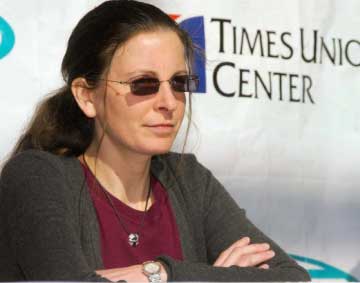Keith Raniere from a YouTube video.
A federal lawsuit filed by NXIVM (pronounced nexium) against cult tracker Rick A. Ross was dismissed last month by US District Judge Katharine S. Hayden after 14 years in federal court.
Keith Raniere, of Albany, NY, is the founder of NXIVM, a “human potential company” that offers personal growth seminars based on Raniere’s “Rational Inquiry” system.
In the lawsuit, Raniere claimed defamation, copyright and trade secret violations after Ross published reports by Dr. Paul Martin, a psychologist, and Dr. John Hochman, a psychiatrist, which characterized NXIVM as a cult that brainwashed seminar participants.
The reports excerpted passages from copyrighted NXIVM materials, but did not include the full text or substantial portions of it.
Raniere attempted to obtain an injunction to remove the reports from the internet after they first appeared on rickross.com in July 2003. The injunction was denied including on appeal up to the US Supreme Court.
The reports remain online on Ross’ Cult Education Institute website.
In addition to Ross, Raniere sued his former student Stephanie Franco and her parents, Morris and Rochelle Sutton.
The suit alleged the Suttons paid Ross to “deprogram” their son, Michael, who, after taking courses with NXIVM, decided to sell his share of the family’s apparel business.
Franco, Michael’s sister, who also attended NXIVM seminars, gave her class notes to Ross to help him dissuade her brother from continuing with classes. The notes formed the basis for the doctors’ criticism.
According to court filings, after Michael Sutton sold his interest in the company, he lent Raniere more than $1 million which Raniere said he lost in the commodities market.
US Judge Hayden, in dismissing the lawsuit, concluded, “that defendants’ use of NXIVM materials was limited and protected critical reporting under the fair use doctrine. Defendants did not attempt to use the copyrighted work for commercial profits, for unfair business advantage, or as an attempt to compete. Insofar as plaintiffs characterize the psychologists’ articles as an attempt to undermine NXIVM’s business, the Court notes there are First Amendment concerns to be reckoned with. ‘If criticisms on defendants’ websites kill the demand for plaintiffs’ service, that is the price that, under the First Amendment, must be paid in the open marketplace for ideas.’”
Clare and Sara Bronfman, two heirs to the Seagram’s liquor fortune, reportedly funded Raniere’s lawsuit.
During the 14-year litigation, Ross was represented pro bono Douglas Brooks, Thomas Gleason, Peter Skolnik, Michael Norwick and Thomas Dolan. Public Citizen of Washington D.C. and the Berkman Klein Center for Internet & Society at Harvard University also provided assistance.

Clare Bronfman lost a reported $150 million with Keith Raniere.
NXIVM and Raniere were represented by successive law firms including Latham & Watkins, Harris Beach, Proskauer Rose, Schmeiser, Olsen& Watts, Nolan & Heller, Tompkins McGuire Wachenfeld & Barry, Drinker Biddle & Reath and Bartolomei & Associates.
The Albany Times-Union called NIXVM a “Litigation Machine” and reported that the Bronfmans funded Raniere’s numerous lawsuits to “punish enemies” and he “swallowed as much as $150 million of their fortune” including $66 million Raniere claimed he lost in commodities investments.
Raniere lost another lawsuit recently when U.S. District Judge Barabra M.G. Lynn dismissed his claims against AT&T and Microsoft. Raniere sued based upon claims he invented video conferencing. Judge Lynn admonished Raniere when he was unable to prove ownership of the patents, criticizing Raniere for deceiving the court and awarded attorney fees and costs to defendants, AT&T $935,300 and Microsoft $202,000.
A 2003 Forbes article, in which Edgar Bronfman Sr. called NXIVM ‘a cult’ stated, “Raniere runs a cult-like program aimed at breaking down his subjects psychologically, separating them from their families and inducing them into a bizarre world of messianic pretention, idiosyncratic language and ritualistic practices.”
Raniere’s training is discussed in Ross recent book, “Cults Inside Out: How People Get In and Can Get Out”.

Rick Ross prevailed in a 14 year old lawsuit waged by Keith Raniere against him. Raniere’s attorneys were reportedly funded by Clare Bronfman.
In a recent development, Raniere guided Clare Bronfman to commit perjury in a federal criminal case against newspaper publisher Frank Parlato in Western New York, Parlato alleges.
In two civil lawsuits, Clare Bronfman swore under oath that she had no written contract with Parlato, but, in the criminal case, according to a letter written by Assistant US Attorney Anthony M. Bruce, Bronfman swore in the grand jury that a binding contract did exist with Parlato – even though she never signed it.
The on-again-off-again contract is the central document for charges against Parlato related to the Bronfman sisters.




















